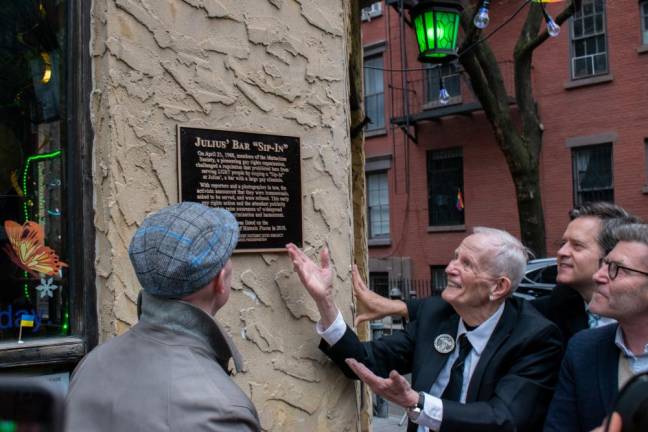Remembering a ‘Sip-In’ for Gay Rights 56 Years Later
April 22, 2022
By: Leah Foreman
A permanent plaque at Julius’ Bar to commemorate the fight against discrimination

Fifty-six years ago, at Julius’ Bar in Greenwich Village, four openly gay men held a “Sip-In.”
The men were Dick Leitsch, Craig Rodwell, John Timmons and Randy Wicker and they were part of an early gay rights group known as the Mattachine Society. Leitsch and Rodwell were the New York chapter of the Mattachine Society’s president and vice president respectively.
On April 21, 1966, they traveled to various city bars with reporters to document the discrimination they faced under the New York State Liquor Authority, which prevented suspected gay or lesbian people from being served alcohol. After arriving at Julius’, they told the bartender they were homosexuals and he put his hand over a glass in front of them, denying them service.
This moment was captured in a photograph for the Village Voice by the late photographer Fred W. McDarrah. This resulted in unprecedented coverage of LGBTQ activism and civil rights.
The event later led to a change in NYSLA policy.
Today, this history is often overlooked. And Randy Wicker is the only surviving member of the Mattachine’s “Sip-In” left to tell the tale.
“When we took this action, we were legally challenging the state laws that said it was illegal to serve homosexuals alcohol or shall allow them to gather on your premises – that’s right of assembly,” Wicker said. “And by taking that legal action, setting that house of cards in order, we cracked the chain that held the Village and held the gay community in this country locked in the hands of the criminal underground.”
“Make Invisible History Visible”
More than 50 years later to the day, people gathered on West 10th Street to celebrate the bar and its history as a permanent plaque was installed to enshrine its contribution to gay civil rights. Julius’ is also the city’s oldest gay bar.
“Today we make an invisible history visible by installing a commemorative plaque on the exterior of Julius’ Bar, an important location in LGBTQ history,” Ken Lustbader, a founder of NYC LGBT Historic Sites Project, said to the crowd.
When NYC LGBT Historic Sites Project was organized in 2015 to protect historically significant sites, Julius’ was the site on the list, which entered the National Register of Historic Places in 2016. Julius’ became the second LGBTQ site in the country on the register, after The Stonewall Inn, which got on in 1999.
The Greenwich Village Society for Historical Preservation worked in concert with NYC LGBT Historic Sites Project to get Julius’ recognized.
“What we’re doing is we’re helping people understand that the process of getting to where we were today was a long and slow one that took a lot of bravery, a lot of perseverance, and a lot of forward thinking by a lot of people —not all of whom are that well remembered today, but they should be,” said Andrew Berman, the executive director of GVSHP.
Plea for Donations
The plaque unveiling was held on the 56th Anniversary of the “Sip-In” and the six-year anniversary of when Julius’ got on the historic registry. It was pushed back because of the bar’s previous financial trouble and to ensure people could celebrate in person.
From shutting down the bar completely before St. Patrick’s Day in 2020 to serving to-go burgers only to limited indoor seating to surviving the brunt of the pandemic, Julius’ has been through the ringer. The bar’s owner, Helen Buford, made a plea for donations.
She received donations from patrons and from the Gil Foundation, a pro-LGBTQ philanthropic organization, which donated $20,000 and pledged to match donations on a GoFundMe created for the bar up to $25,000.
Broadway star and multihyphenate talent John Cameron Mitchell was born three years to the day before the “Sip-In.”
“This place is not going to become a Starbucks,” Mitchell said on April 21 in front of Julius’.
Except for during COVID, Mitchell and his friends have held dance parties at Julius’ once a month.
State Senator Brad Hoylman presented Buford with a certificate honoring Julius’ designation as a historic business in New York.
“I see this as kind of a collective F.U. to Florida and Texas as we stand here,” Hoylman said. “Because we are not going to let queer history be erased.”
Randy Wicker got up to the podium and spoke after being cajoled by the eager audience.
“So there are two reasons that Julius’ [is] my favorite bar. First of all, it’s because it was the place where we started the ball rolling to liberate our society from the mob. The second is a little bit more personal,” Wicker said as he pulled out a New York Times clipping, encased in plastic. “I got my picture two times on the obituary page of the New York Times. And I’m still here at 84 years old, to tell you about it … and say I’m still here, I’m still fighting. I’m the last Mattichino and will stay active as long as I can.”
I see this as kind of a collective F.U. to Florida and Texas as we stand here. Because we are not going to let queer history be erased. —State Senator Brad Hoylman